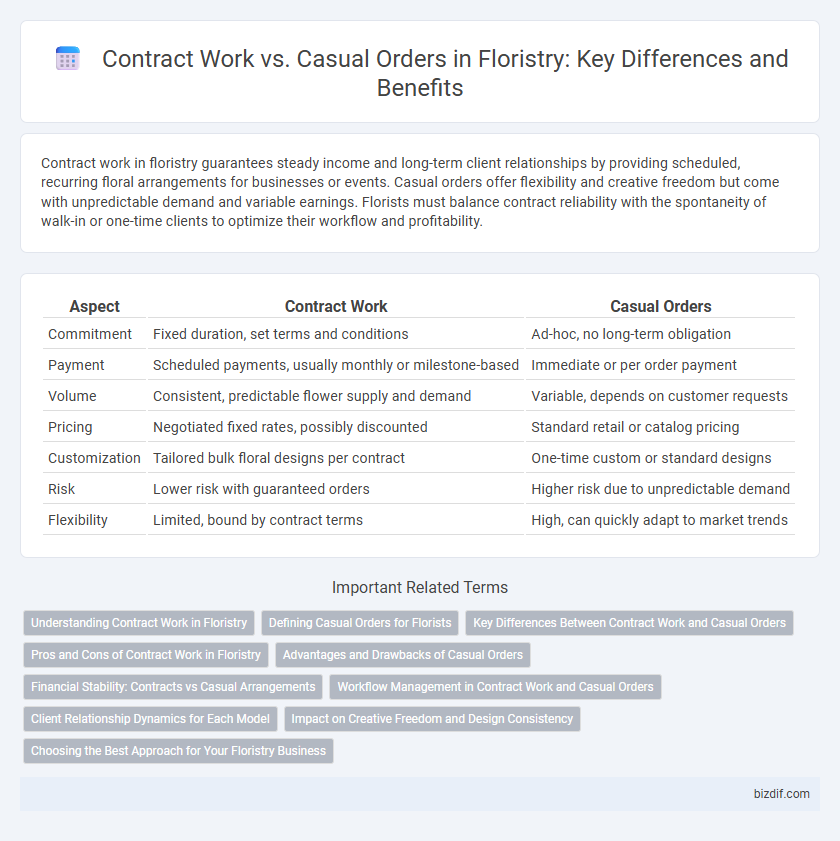Contract work in floristry guarantees steady income and long-term client relationships by providing scheduled, recurring floral arrangements for businesses or events. Casual orders offer flexibility and creative freedom but come with unpredictable demand and variable earnings. Florists must balance contract reliability with the spontaneity of walk-in or one-time clients to optimize their workflow and profitability.
Table of Comparison
| Aspect | Contract Work | Casual Orders |
|---|---|---|
| Commitment | Fixed duration, set terms and conditions | Ad-hoc, no long-term obligation |
| Payment | Scheduled payments, usually monthly or milestone-based | Immediate or per order payment |
| Volume | Consistent, predictable flower supply and demand | Variable, depends on customer requests |
| Pricing | Negotiated fixed rates, possibly discounted | Standard retail or catalog pricing |
| Customization | Tailored bulk floral designs per contract | One-time custom or standard designs |
| Risk | Lower risk with guaranteed orders | Higher risk due to unpredictable demand |
| Flexibility | Limited, bound by contract terms | High, can quickly adapt to market trends |
Understanding Contract Work in Floristry
Contract work in floristry involves establishing long-term agreements with clients, ensuring consistent supply and customized floral designs to meet specific event or business needs. This approach allows florists to plan inventory efficiently, optimize labor, and maintain steady revenue streams through predictable demand. Understanding these contracts improves client relationships and enhances operational stability compared to casual, one-time floral orders.
Defining Casual Orders for Florists
Casual orders in floristry refer to one-time or irregular flower arrangements requested without a long-term commitment, often driven by spontaneous events or individual customer needs. These orders provide flexibility for florists, allowing them to manage inventory and labor based on immediate demand rather than scheduled contracts. Understanding the nature of casual orders helps florists optimize pricing, stock selection, and creative design tailored to diverse, unpredictable clientele.
Key Differences Between Contract Work and Casual Orders
Contract work in floristry involves long-term agreements guaranteeing consistent floral supply and service, often with fixed pricing and specific delivery schedules. Casual orders are short-term, ad-hoc purchases based on immediate demand, offering flexibility but with variable costs and availability. Key differences include commitment length, pricing stability, and predictability of supply, which influence budgeting and inventory management for florists.
Pros and Cons of Contract Work in Floristry
Contract work in floristry offers stability with consistent income and secured client relationships, fostering deeper creative collaboration and brand recognition. However, it may limit flexibility, binding florists to specific terms and reducing opportunities for spontaneous projects or diverse clientele. Commitment to contract obligations can also increase pressure during peak seasons, potentially affecting work-life balance and creative freedom.
Advantages and Drawbacks of Casual Orders
Casual orders in floristry provide flexibility for both florists and clients, allowing quick responses to spontaneous events or last-minute requests, which can boost short-term revenue. However, casual orders often lack the predictability and stability of contract work, leading to inconsistent workflow and potential challenges in inventory management. This unpredictability may result in higher costs for sourcing materials and increased pressure on staff during peak times.
Financial Stability: Contracts vs Casual Arrangements
Contract work in floristry offers predictable revenue streams and steady cash flow, enhancing financial stability through fixed agreements with clients or event planners. Casual orders provide flexibility but can result in fluctuating income due to inconsistent demand and seasonal variations. Relying on contract work enables florists to better manage expenses and plan growth, while casual arrangements require careful financial oversight to mitigate periods of low sales.
Workflow Management in Contract Work and Casual Orders
Contract work in floristry involves predefined schedules and consistent client requirements, enabling streamlined workflow management through advanced planning and resource allocation. Casual orders require flexible workflow strategies to accommodate unpredictable demand and varied floral designs, necessitating rapid inventory updates and real-time task adjustments. Efficient workflow management in floristry balances contract commitments with casual order responsiveness to optimize staff productivity and floral quality.
Client Relationship Dynamics for Each Model
Contract work fosters long-term client relationships through consistent floral services tailored to ongoing needs, enhancing trust and satisfaction. Casual orders offer flexibility and variety, attracting clients seeking spontaneous or one-time arrangements but may limit deep relationship development. Understanding these dynamics helps florists strategically balance reliability and adaptability in client engagement.
Impact on Creative Freedom and Design Consistency
Contract work in floristry often limits creative freedom due to predefined client requirements and strict timelines, ensuring design consistency but potentially stifling innovation. Casual orders provide florists greater artistic expression, allowing experimentation with unique floral arrangements and styles, though this can lead to variability in design quality. Balancing contract work and casual projects enables florists to maintain a steady income while exploring creative possibilities and enhancing their portfolio.
Choosing the Best Approach for Your Floristry Business
Contract work in floristry ensures steady income, predictable scheduling, and long-term client relationships, ideal for businesses seeking stability and consistent demand. Casual orders offer flexibility, diverse project variety, and the ability to capitalize on seasonal spikes or special events, benefiting florists who prioritize adaptability and creative freedom. Evaluating factors like workload consistency, client base, and cash flow needs helps determine the optimal mix for sustainable growth and profitability in a floristry business.
Contract work vs Casual orders Infographic

 bizdif.com
bizdif.com